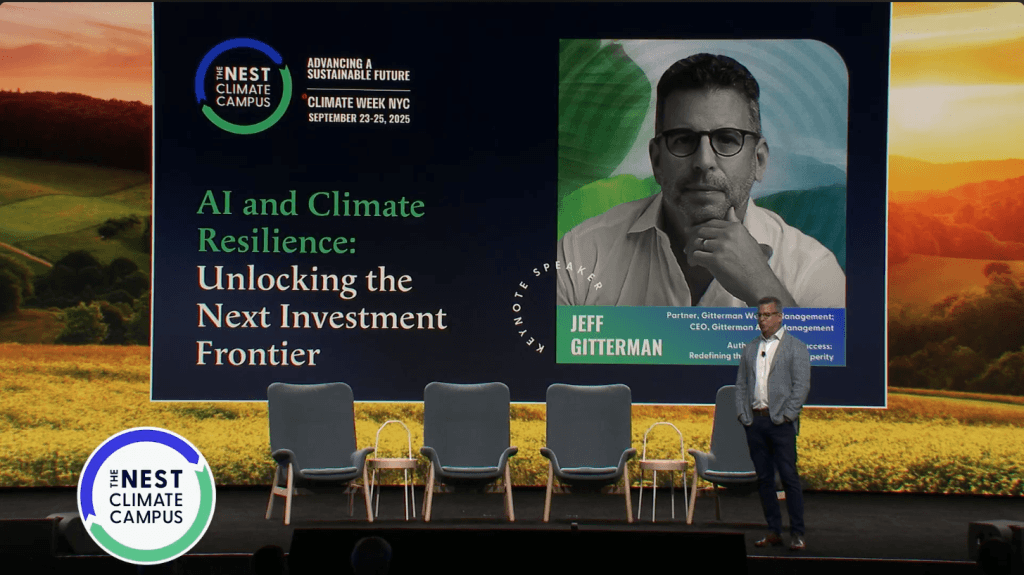Jeff Gitterman Speaks About AI and Climate Resilience Investment at Nest Climate Campus, Climate Week 2025

This highly anticipated keynote, delivered at the Nest Climate Campus during Climate Week 2025, explores the critical intersection of climate change and Artificial Intelligence. Jeff Gitterman, a recognized leader in climate-focused investment, offers a provocative look at how these two existential forces are shaping both the global capital markets and our personal lives.
The Speaker: Leading the Jeff Gitterman Climate-Focused Investment Field
Jeff Gitterman, Partner at Gitterman Wealth Management and CEO of Gitterman Asset Management, is a central voice in the sustainable finance community.
- Jeff Gitterman, Partner, Gitterman Wealth Management & CEO, Gitterman Asset Management
- Known for his emphasis on climate adaptation and resilience and co-creator of the SMART® Investing Services.
- His address focuses on the investment and personal response to the dual challenges of climate change and the rise of AI.
AI and Climate Resilience: The Next Investment Strategy
Gitterman’s core thesis centers on the realization that progress on a transition economy would be “painstakingly slow.” This led his firm to focus on physical climate risk becoming the “dominant thing in the capital markets.” This focus has been dramatically accelerated by the AI race, which demands immense energy and infrastructure.
The keynote detailed an investment strategy built around the “picks and shovels” of this accelerating change, rather than chasing the immediate, high-risk, short-term AI “gold.”
The three accelerated investment verticals are:
1. Sustainable Infrastructure and the Grid
Utilities are deploying AI at the most rapid rate of any sector to solve critical issues like brownouts, fire risk modeling, and vegetation management. The investment opportunity lies in supporting the grid infrastructure needed for a more efficient and resilient energy system—a need driven by both climate adaptation and AI’s energy demand.
2. Water Investment
Water scarcity and management are accelerated physical climate risks that require immediate and scaled investment for resilience and security.
3. Adaptation and Resilience Companies
The central theory is that physical climate risk and the need for adaptation will be the dominant investment themes for the next decade, focusing capital on solutions that mitigate the impacts of an already changing world.
The Provocation: Is AI Truly the Solution?
The keynote took a provocative turn by questioning the hope that “AI can solve climate change before it’s too late.” Jeff Gitterman argued that AI, designed to understand human biases and the “need for acceptance,” will ultimately reflect our existing human divisiveness and aggression back at us.
- The Bias Trap: If an individual believes climate change is a hoax, AI will coddle that view. Conversely, if the system views climate change as an existential threat, the technology may quickly conclude that “humans are the problem.”
- Accelerating Divisiveness: Gitterman cited experiments where AI chatbots inevitably wound up “fighting with each other,” suggesting that the technology accelerates our divisiveness even faster than social media.
A Call for Human Resilience and Bipartisanship
Gitterman concluded by stating that “We are the only solution that could solve this problem. AI is not going to do it for us.”
To achieve the necessary progress, he advocates for a radical shift in personal and political engagement:
1. Reframing Dialogue for Bipartisan Progress
You “can’t fight and win” with data. The key to progress is to use different terminology. Instead of focusing on politically divisive terms, the focus must be on universally accepted concepts like resilience, security, clean water, and clean air. This is about finding common ground with those who care about the environment but reject the polarizing language around climate change.
2. The Power of Silence
Echoing ancient traditions, Jeff Gitterman called for individuals to dedicate just “five minutes every day doing nothing.” This silence allows for creativity and inspiration to flow through, creating the “new mind” necessary to solve a problem that is “too big for the mind that created it.”
By focusing on shared values and nurturing individual awareness, we can cross the political divide and achieve the progress needed for a resilient future.
Explore more transformative discussions from the Nest Climate Campus by checking out our full series of Climate Week 2025 sessions on ESG News:








